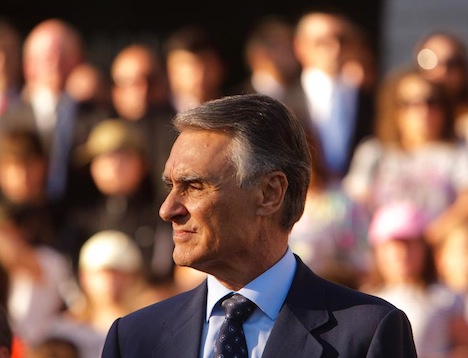Until today, Portgual’s beleaguered government looked like it would avoid crisis — just barely.![]()
But the decision by Portugal’s president to seek a broad unity government to carry out the terms of Portugal’s bailout program has cast doubt again on whether the center-right government led by Pedro Passos Coelho will be able to serve through the end of its natural term of government in 2015 or at least long enough to see through the termination of the €78 billion bailout program in June 2014.
Despite a deal last week that saw Passos Coelho’s more conservative coalition partners agree to return to government, Portuguese president Aníbal Cavaco Silva, who served as prime minister of Portugal from 1985 to 1995, is now pushing for a broader coalition in light of risks that the government might falter again. Cavaco Silva’s top priority is that Portugal has a reliably strong government to see through the bailout program next year and to avoid snap elections now in favor of early elections sometime next June.
But that appears to have backfired, and it remains unclear just what will happen next in Portugal’s governing crisis — Cavaco Silva’s ploy may have made early elections even likelier, which are certain to become a referendum on further austerity measures in accordance with Portugal’s bailout. The political crisis comes at a time when Lisbon was set to host International Monetary Fund and European Union officials next Monday for a review of the bailout program and amid reports that Portugal will require a second bailout when the current one runs out next year.
Portugal’s most recent crisis began when finance minister Vítor Gaspar resigned on July 1 after rising complaints over the implementation of the bailout program. Gaspar, a technocratic economist first appointed after the June 2011 elections that swept Passos Coelho and his center-right Partido Social Democrata (PSD, Social Democratic Party) into power. He had become the poster child for austerity and widely reviled as Passos Coelho’s party has fallen up to 10 points behind the main center-left opposition, the Partido Socialista (PS, Socialist Party) in polls.
Passos Coelho immediately appointed treasury secretary Maria Luís de Albuquerque as Gaspar’s replacement, but the following day, his foreign minister Paulo Portas resigned. Portas, also the leader of his more socially conservative coalition partner, the Centro Democrático e Social – Partido Popular (CDS-PP, Democratic and Social Center — People’s Party), indicated that he would pull his party’s support from the coalition in opposition to the new finance minister’s appointment, arguing that it marked a continuity of policy with which Portas and his party now disagreed.
Nonetheless, a weekend deal between Passos Coelho and Portas appeared to have healed the rift — Portas would become deputy prime minister and take a larger role in steering the country’s finances, though de Albuquerque would remain as the new finance minister. Though the deal required Cavaco Silva’s approval, it seemed likely to win it this week, given that Cavaco Silva (pictured above) had been crucial in bringing Passos Coelho and Portas back together.
Instead, Cavaco Silva’s call for a unity government to include the Socialist Party as well has renewed the Portuguese political crisis, given that the Socialists and their new leader, António José Seguro, continue to push for early elections rather than join a unity government.
Though Portuguese 10-year bond yields have fallen from a recent July 3 high of 7.47%, they edged up to a still-worrying 6.77% today after Cavaco Silva’s gambit.
While Cavaco Silva may have failed, his logic isn’t unreasonable. Cavaco Silva’s goal was to steer Portugal between what he viewed as two poor alternatives — one in which he’ll have to trust Portas and the conservative Christian Democrats to see through the bailout program, and another in which Portugal faces snap elections that could result in a hung parliament (or worse, if the two major leftist blocs outperform already robust expectations).
Continue reading Coalition crisis brings Portugal back to center-stage in eurozone bailouts saga
